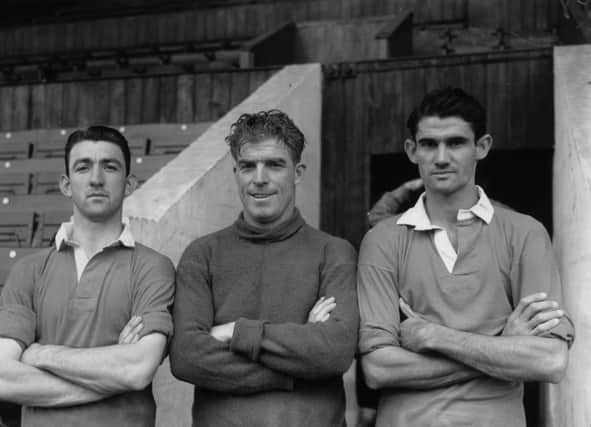Obituary: John Hewie, Scottish/South African footballer


The footballer “Long” John Hewie was widely believed to be one of the most versatile Scottish international players ever.
He won 19 Scotland caps between 1956 and 1960, but excelled at other sports too: he was good at tennis and played hockey to a good standard in his native South Africa; was selected for England representative teams, both before and after his Scotland debut; played county-level table tennis and was an England “cap” at baseball. All this, without ever losing his strong South African accent.
Advertisement
Hide AdAdvertisement
Hide AdBorn in South Africa, of parents originally from Selkirk, the apprentice pattern maker was signed by Charlton manager Jimmy Seed – who made a habit of signing South Africans – in 1949, making his Charlton debut two years later, against Portsmouth.
He quickly featured on England manager Walter Winterbottom’s radar and was selected for two FA representative sides within months of making his debut. This was before age-group internationals and the big Springbok, who stood six foot two inches tall, was being groomed for a possible England call-up.
However, Dr Montgomery, the Charlton club doctor, had other ideas and, knowing about Hewie’s Scottish parentage, he alerted the SFA to his progress. As a result, Hewie first set foot in the land of his ancestors when called up to the Scotland B team, to face England at Easter Road, in March 1953.
By all accounts, he did not play well, facing future England winger and pop singer Colin Grainger and he promptly dropped out of the Scotland reckoning. However, in March 1956, a “Scotland” XI faced “South Africa”, in reality a team of British-based South Africans, at Ibrox, in a game to raise funds for the British Olympic team which was to travel to Melbourne for that year’s Olympic Games.
There were no Rangers players in the Scotland team, but Don Kitchenbrand and Johnny Hubbard were in the green-shirted South African team, who had the backing of the majority of the 50,000 crowd. Scotland won the match, but Hewie was outstanding; as one report of the time noted: “He reduced (Gordon) Smith to the level of an ordinary player.”
Weeks later, he won the first of his 19 Scotland caps, at left-back, against England at Hampden. Again he played well, being credited with an “assist” for the Scotland goal, scored by the other debutant that day, Aberdeen’s Graham Leggat.
This was the first of ten straight caps for the Charlton player – the fact that Athletic were relegated in 1957 didn’t even cost him his international place. He scored his first Scotland goal, with a fiercely struck penalty, in the 4-2 Hampden win over Spain which opened the qualifying campaign for the 1958 World Cup.
He lost his place, temporarily, towards the end of that campaign, but was included in the final 22 for the finals in Sweden, playing in the opening game against Yugoslavia and the final one, against France, during which he missed a penalty at 0-0.
Advertisement
Hide AdAdvertisement
Hide AdMany years later Hewie said that the “what-if” aspect of that miss preyed on his mind on a daily basis, as France went on to win the game 2-1 and knock Scotland out.
Usually left back for Scotland, he had a couple of games at left-half, before winning his 19th and last cap against Poland in May 1960. He scored his only other Scotland goal, in his 17th international, a 4-0 win over Northern Ireland, at Windsor Park, in October 1959.
He returned to his former South African club, Arcadia of Johannesburg, in June 1960, but within six months he was back at the Valley with Charlton, going on to play 530 games for the club, wearing all 11 numbers during that run.
He even, in season 1961-62, was first-choice goalkeeper for four games after injury ruled out regular keeper Willie Duff, the former Hearts and Scotland Under-23 goalkeeper, and the back-up keeper.
Hewie was one of the 22 players involved in the legendary “greatest comeback ever” when Charlton, trailing 2-0 at half-time, then down to ten men, losing 5-1 midway through the second half, battled back to beat Huddersfield Town 7-6 at the Valley in December 957.
He also played for the London XI, the first English team to compete in Europe, during the first Inter-Cities Fairs Cup competition, which began in 1954 and ended in 1958.
On finally hanging up his boots in 1966, his final Charlton appearance was against Bolton Wanderers, Hewie went back to Arcadia for a couple of years, before returning to London to work as a football coach for the Inner London Education Authority, and manage Bexley United.
He later returned to South Africa for a final spell in management, before buying a garage which he ran successfully before retiring.
Advertisement
Hide AdAdvertisement
Hide AdThe worsening security situation in his native country forced Hewie, in 1994, to return to the UK, where he and his wife Rachel settled in the village of Donington in Lincolnshire.
He was always a welcome guest when he revisited Charlton and he admitted the club’s travails, particularly the loss of the Valley, where he had practised his golf on the huge terraces in the summer, greatly affected him.
His last few years were blighted by dementia and he died in a care home in his adopted Lincolnshire on Monday.
Rachel predeceased her husband last year. John Hewie is survived by his son Adam, daughter Alison and their families.